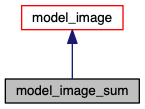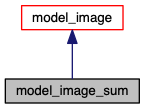model_image_sum Class Reference
Defines a summed image model. More...
#include "model/model_image_sum.h"
Inheritance diagram for model_image_sum:

Collaboration diagram for model_image_sum:

Public Member Functions | |
| model_image_sum (std::vector< model_image * > images, std::string offset_coordinates="Cartesian") | |
| Constructor. Takes a vector of pointers to model_image objects. | |
| model_image_sum (std::string offset_coordinates="Cartesian") | |
| Constructor. Makes empty sum object, models can be added with add_model_image. | |
| virtual | ~model_image_sum () |
| Constructor. Takes a pair of model_image objects. | |
| void | add_model_image (model_image &image) |
| Add an image. | |
| virtual size_t | size () const |
| A user-supplied function that returns the number of the parameters the model expects. | |
| virtual void | generate_model (std::vector< double > parameters) |
| A one-time generate function that permits model construction prior to calling the visibility_amplitude, closure_phase, etc. for each datum. Takes a vector of parameters. | |
| virtual std::complex< double > | visibility (datum_visibility &d, double acc) |
| Returns complex visibility in Jy computed from the image given a datum_visibility_amplitude object, containing all of the accoutrements. While this provides access to the actual data value, the two could be separated if necessary. Also takes an accuracy parameter with the same units as the data, indicating the accuracy with which the model must generate a comparison value. Note that this is redefined to accomodate the possibility of using the analytical computation. | |
| virtual double | visibility_amplitude (datum_visibility_amplitude &d, double acc) |
| Returns visibility ampitudes in Jy computed from the image given a datum_visibility_amplitude object, containing all of the accoutrements. While this provides access to the actual data value, the two could be separated if necessary. Also takes an accuracy parameter with the same units as the data, indicating the accuracy with which the model must generate a comparison value. Note that this is redefined to accomodate the possibility of using the analytical computation. | |
| virtual double | closure_phase (datum_closure_phase &d, double acc) |
| Returns closure phase in degrees computed from the image given a datum_closure_phase object, containing all of the accoutrements. While this provides access to the actual data value, the two could be separated if necessary. Also takes an accuracy parameter with the same units as the data, indicating the accuracy with which the model must generate a comparison value. Note that this is redefined since the closure phase of Gaussian images is identically zero. | |
| virtual double | closure_amplitude (datum_closure_amplitude &d, double acc) |
| Returns closure amplitude computed from the image given a datum_closure_phase object, containing all of the accoutrements. While this provides access to the actual data value, the two could be separated if necessary. Also takes an accuracy parameter with the same units as the data, indicating the accuracy with which the model must generate a comparison value. Note that this can be redefined in child classes. | |
| virtual void | set_mpi_communicator (MPI_Comm comm) |
| Sets the MPI communicator if the underlying images are parallelized. | |
| virtual std::string | model_tag () const |
| Return a string that contains a unique identifying tag for use with the ThemisPy plotting features. This function SHOULD be defined in subsequent model_image classes with a unique identifier that contains sufficient information about the hyperparameters to uniquely determine the image. By default it writes "UNDEFINED". | |
 Public Member Functions inherited from model_image Public Member Functions inherited from model_image | |
| virtual void | generate_complex_visibilities () |
| A one-time generate function that will generate the complex visibilities and store them. This must be called after generate_model has been called. | |
| void | output_image (std::string fname, bool rotate=false) |
| void | get_image (std::vector< std::vector< double > > &alpha, std::vector< std::vector< double > > &beta, std::vector< std::vector< double > > &I) const |
| Provides direct access to the constructed image. Sets a 2D grid of angles (alpha, beta) in radians and intensities in Jy per steradian. | |
| void | get_visibilities (std::vector< std::vector< double > > &u, std::vector< std::vector< double > > &v, std::vector< std::vector< std::complex< double > > > &V) const |
| Provides direct access to the complex visibilities. Sets a 2D grid of baselines (u,v) in lambda, and visibilites in Jy. | |
| void | get_visibility_amplitudes (std::vector< std::vector< double > > &u, std::vector< std::vector< double > > &v, std::vector< std::vector< double > > &V) const |
| Provides direct access to the visibility amplitudes. Sets a 2D grid of baselines (u,v) in lambda, and visibilites in Jy. | |
| void | use_spline_interp (bool use_spline) |
| Provides ability to use bicubic spline interpolator (true) instead of regular bicubic. Code defaults to false. | |
| void | write_model_tag_file (std::string tagfilename="model_image.tag") const |
| Write a unique identifying tag for use with the ThemisPy plotting features. This calls the overloaded version with the outstream, which is the only function that need be rewritten in child classes. | |
| virtual void | write_model_tag_file (std::ofstream &tagout) const |
| Write a unique identifying tag for use with the ThemisPy plotting features. For most child classes, the default implementation is suffcient. However, should that not be the case, this is the only function that need be rewritten in child classes. | |
Private Member Functions | |
| virtual void | generate_image (std::vector< double > parameters, std::vector< std::vector< double > > &I, std::vector< std::vector< double > > &alpha, std::vector< std::vector< double > > &beta) |
| Note that this is not defined because there is no uniform image size/resolution specification. | |
Private Attributes | |
| std::vector< model_image * > | _images |
| std::string | _offset_coordinates |
| Choose coordinate system in which to specify offset ("Cartesian","polar") | |
| size_t | _size |
| Number of parameters total. | |
| std::vector< double > | _x |
| x offset position in radians | |
| std::vector< double > | _y |
| y offset position in radians | |
Additional Inherited Members | |
 Protected Attributes inherited from model_image Protected Attributes inherited from model_image | |
| MPI_Comm | _comm |
| bool | _generated_model |
| True when a model is generated with generate_model. | |
| bool | _generated_visibilities |
| True when model visibilities have been computed. | |
| bool | _use_spline |
| True when want to use bicubic spline interpolator. | |
| double | _position_angle |
| Position angle of the image, assumed to be the last element of the parameter list passed to generate_model. Assumed to be in radians and defined E of N. | |
| std::vector< double > | _current_parameters |
| Last set of parameters passed to generate_image, useful to determine if it is necessary to recompute the model. Useful, e.g., if we are varying only position angle, or if recomputing for a number of different data sets at the same set of parameters. | |
| std::vector< std::vector< double > > | _alpha |
| 2D grid of horizonal pixel locations in radians, relative to the fiducial direction of the image (i.e., unrotated by the position angle). | |
| std::vector< std::vector< double > > | _beta |
| 2D grid of vertical pixel locations in radians, relative to the fiducial direction of the image (i.e., unrotated by the position angle). | |
| std::vector< std::vector< double > > | _I |
| 2D grid of intensities at pixel locations in Jy/str. | |
 Protected Attributes inherited from model_visibility Protected Attributes inherited from model_visibility | |
| MPI_Comm | _comm |
 Protected Attributes inherited from model_visibility_amplitude Protected Attributes inherited from model_visibility_amplitude | |
| MPI_Comm | _comm |
 Protected Attributes inherited from model_closure_phase Protected Attributes inherited from model_closure_phase | |
| MPI_Comm | _comm |
 Protected Attributes inherited from model_closure_amplitude Protected Attributes inherited from model_closure_amplitude | |
| MPI_Comm | _comm |
Detailed Description
Each image component has its full complement of parameters, appended in order of the summation. The resulting image is simply the sum of the intensity map from the each underlying object. This sum is performed in the visibilty plane.
Parameter list:
- parameters[0] ... Model 1 parameters[0].
...
- parameters[N1-1] ... Model 1 last parameter.
- parameters[N1] ... Model 1 offset in x.
- parameters[N1+1] ... Model 1 offset in y.
- parameters[N1+2] ... Model 2 parameters[0].
...
- parameters[N1+N2+1] ... Model 2 last parameter.
- parameters[N1+N2+2] ... Model 2 offset in x.
- parameters[N1+N2+3] ... Model 2 offset in y.
...
- parameters[-1] ... Position angle (in model_image) in radians
Note that offsets for all components are included. These are often not necessary, and can be set to fixed values via priors if needed.
The documentation for this class was generated from the following files:
- model/model_image_sum.h
- model/model_image_sum.cpp

